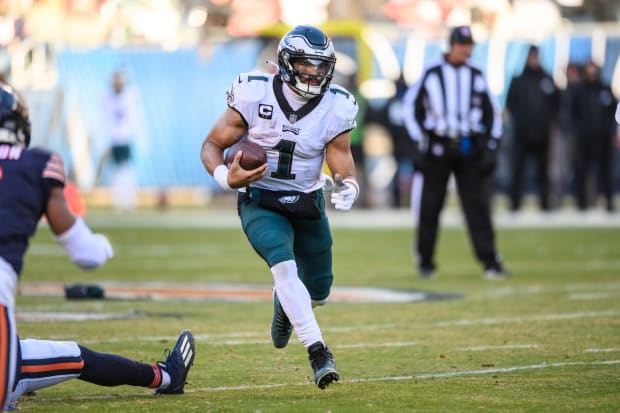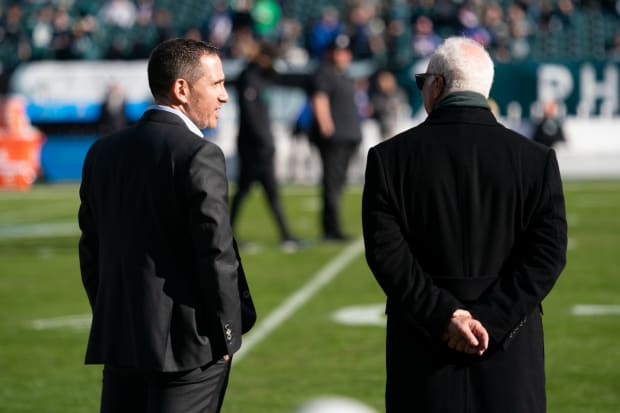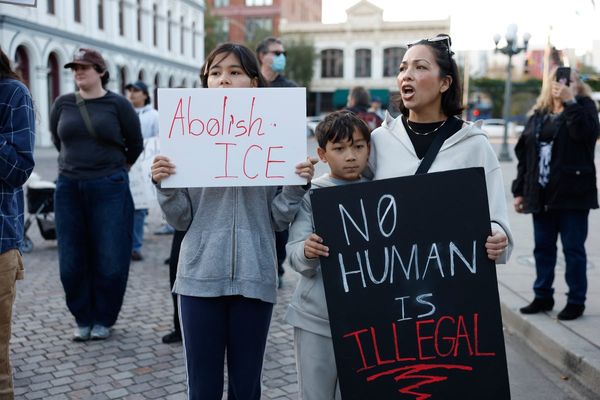Our Super Bowl LVII cover story, by the numbers: My colleague Conor Orr and I conducted 50-plus interviews with Chiefs, Eagles, relatives, coaches, support staff, musicians, actors, Hall of Famers, retired players, baseball managers and executives and retired players, and fans. They were conducted over videoconference, over phone, in person, in group settings (that don’t count in the total), while traversing hotel grounds, walking downtown streets, riding in Ubers, driving rental cars (safely) and hiking up Camelback mountain. We ended up with 77 Word files, more than 20 Google docs and with more than 20,000 words written on both teams. I banked 10 hours of sleep Super Bowl week and eight hours the night before. We filed at 5:10 a.m. local time—50 minutes before deadline, a first in the nine Super Bowl cover stories I’ve done.
This was what fit into that cover story on the Chiefs, their all-galaxy quarterback Patrick Mahomes, their teaching-soul coach Andy Reid and their too-often-overlooked general manager Brett Veach.
Chiefs fans, purchase a print copy of the commemorative here.
That said, it always pains me when I think about the amount of original, never-before-seen reporting that goes unused. So this year we decided to do something different and share that material postgame. Over the next week, we’ll toll it out in installments. Here’s the first …
The lede we would have used if the Eagles won

Daniel Bartel/USA TODAY Sports
The Eagles’ sideline gasps, together, all at once, united by fear born from 10 terrible seconds—one random play, one significant injury, one seriously? moment—that threatens to unravel a season of great promise.
It’s mid-December in Chicago, deep into a game that meant little more than playoff seeding, but now means everything. Philadelphia has spent all season as the NFC’s best team, complete and dominant and tethered to a quarterback amid an MVP campaign that no one except him saw coming. Jalen Hurts makes the Eagles a Super Bowl favorite. And that’s him, late in the third quarter, lying and grimacing and swearing on the nearly frozen Bermuda grass at Soldier Field.
Jordan Mailata, the team’s singing giant at left tackle, jogs over to his quarterback. “Stay down,” Mailata says. “You’re hurt.”
Hurts know, right away, that Mailata is right. He is hurt. He should jog over to the sideline and visit with team doctors. But knowing that isn’t the same as doing that, or even wanting to do that. He shelves the grimace momentarily, stares at his tackle with great urgency and yells a single sentence that will come to define these Eagles and their latest Super season.
Get me the f--- up!
Hurts stays in. The Eagles run another play, a short pass to DeVonta Smith that brings the quarter to an end. They lead the lowly Bears, 14–13.
Hurts walks slowly to the sideline where he’s met by Ted Rath, the team’s director of sports performance. Rath shapes minds and bodies and moments just like this one. “My s---’s broke,” Hurts says.
“Can you be more descriptive?” Rath asks, laughing in an attempt to make Hurts feel better. “What the f--- are you talking about?”
Hurts points to his right shoulder, the perch on which Philadelphia’s ambitions sit. “My shoulder,” he says. “I felt it. I think I just broke my collarbone again.”
“Oh, f---,” Rath says. He understands the implications, for quarterback and franchise. Hurts had broken his clavicle in college at Alabama.
Rath organizes his crew around his quarterback in an attempt to block nosey cameramen from seeing their evaluation. They start to look at the shoulder, but Hurts waves them away. Inside this huddle of trainers, in temperatures so low they index at 6°, he stares at them, then says, firmly, leaving no doubt, “I’m not f---ing coming out of this game.”
The fourth quarter begins. Hurts doesn’t come out, despite the pain and bone-chilling wind. Instead, he speeds the offense right downfield. On what would be called an off day only because of the ridiculous standard he set this season—two interceptions, missed throws, something just off—this drive stretches for nearly nine minutes. It ends in a 38-yard field goal by Jake Elliott that stretches the lead to four.
Hurts plays the rest of the game, becoming only the third quarterback in NFL history to surpass 300 passing yards and score three rushing touchdowns the same day. The Eagles win, improving to 13–1, inching closer to locking up the conference’s No. 1 seed.
Ten days before Super Bowl LVII, Hurts explains that afternoon in depth, for the first time, in a phone call with Sports Illustrated. “It was so cold,” he says. “I felt serious pain. I felt pain that I’ve never felt. I couldn’t throw. I was having to throw the ball, too. It was so cold; the ball just wouldn’t come out.” He pauses for five seconds, mind drifting back, then says, “Yeah, it wasn’t easy. Being able to overcome everything that went on in that game, it took a lot. I’m happy I was able to find it in me.”
The diagnosis made things worse, more fraught and more complicated. Hurts had a severely sprained AC joint in his throwing shoulder. The injury, by its medical definition, renders the joint unstable, and that instability shoots pain through injured bodies. No one on the Eagles’ training staff, nor anyone they reached out to, had ever heard of someone playing on that specific injury the same day they suffered it. “It’s an extremely uncomfortable injury, especially for a quarterback on his throwing arm,” Rath says.
This meant that Hurts would sit, and for weeks, missing games where Philadelphia could mathematically clinch conference supremacy and the first-round bye attached to the No. 1 seed. There’s a story there, and it speaks to the Eagles, their heroic quarterback and their indelible season. It involves a passionate fan base, an entrenched philosophy, a white minivan driven to a surprisingly connective job interview, a bearded centerpiece, a new addition at receiver, Michael Jordan, an Oscar and much more.
The walk with Eagles GM Howie Roseman

Bill Streicher/USA TODAY Sports
Down the long, winding, desert road, past two security checkpoints, a dog sniffing cars for explosives and a golf course, the most dominant team of the 2022 NFL season prepares for the only game that matters inside the Sheraton at Wild Horse Pass. If signs matter, here’s one: This is the same hotel that housed the Patriots the last time Arizona hosted a Super Bowl. New England, of course, celebrated its XLIX triumph in early ’15 inside the same ballrooms where Philadelphia now plots to earn some revelry of its own.
The Eagles’ chief architect strolls onto the patio out back. It’s Thursday, three days before kickoff. Howie Roseman wears an Eagles T-shirt, black shorts and black running shoes. Sunglasses shield his eyes from a light breeze and the late-afternoon sun. He doesn’t seem to notice the mountains looming in the distance, nor the cactuses standing guard, along with a sizable human security apparatus, nearby.
The gray hairs intruding on his stubble grow in contrast to the day-to-day existence of the Eagles’ general manager. Roseman started with the franchise in 2000 as a front-office intern, then elevated, often, higher, until “executive vice president” was added to his title in ’19. He’s not just a general manager. He’s a sports executive in Philadelphia, one of the toughest sports towns on the planet. Win a Super Bowl, as he did five seasons ago, and there are still no breaks given, no wiggle room allowed. Many folks who work in similar positions say they never get comfortable in their jobs. Roseman says that, too. But, in his case, it’s accurate.
Consider just these past five seasons. The Eagles made the playoffs in 2018 and ’19, but those appearances failed to mask the obvious: They were headed in the wrong direction. They bottomed out in ’20, finishing 4-11-1, dead last in the NFC East, while resting stars in their meaningless finale against the Giants, drawing a rebuke about respecting the game from the opposing coach, Joe Judge. Soon, they would fire the coach, Doug Pederson; they all won a Super Bowl behind three seasons earlier.
Roseman saw more than a few middle fingers turned up in his direction after that. Sure, he understood that the guaranteed money in Carson Wentz’s contract extension (a record $107 million) looked suboptimal in hindsight. But the logic behind the decision remained sound. He targeted Hurts in that ’20 draft class, knowing that would only compound the Wentz/contract angst in town. Before the next season, he traded Wentz to Indianapolis.
What mattered was the person who tied each of those decisions together: Jeffrey Lurie, who supported Roseman, based on two decades of trust and a shared philosophy of building football teams. Lurie demanded that Roseman be bold and firm and hunt calculated risks for a franchise that chose to chase sporadic Super Bowl seasons over consistent success that failed to yield championships. In a league of conformity, the Eagles wore their hair down.
This was how Roseman began the grand retooling in Philadelphia. He drafted Hurts’s college teammate at Alabama, the Heisman trophy–winning receiver DeVonta Smith, in 2021. He cut or traded high draft picks from recent seasons that hadn’t worked out as expected. He didn’t survive; he worked, toiled, scoured.
By that point, all the heartwarming, post–Super Bowl–triumph stories had long faded. Roseman remembered the person who told him about watching the Philly Special with their father and how they’d never forget that night. He recalled the other person who said their mom died right before the Super Bowl and how they thought of her when the Eagles won and tears streamed down their cheeks. He knew how the Eagles connected wide swaths of Philadelphia and, because he knew that, he understood why fans liked greeting him with a particular digit, or why they screamed, Howie Roseman! F--- you!
On Jeffrey Lurie's exceptional stretch
Last March, Lurie won an Oscar for best documentary for the film he executive produced, Summer of Soul. Five days before the Super Bowl, his general manager, considered the owner’s remarkable 11-month stretch. “An Oscar into a freaking Lombardi Trophy,” Roseman said. “Can you imagine?”







